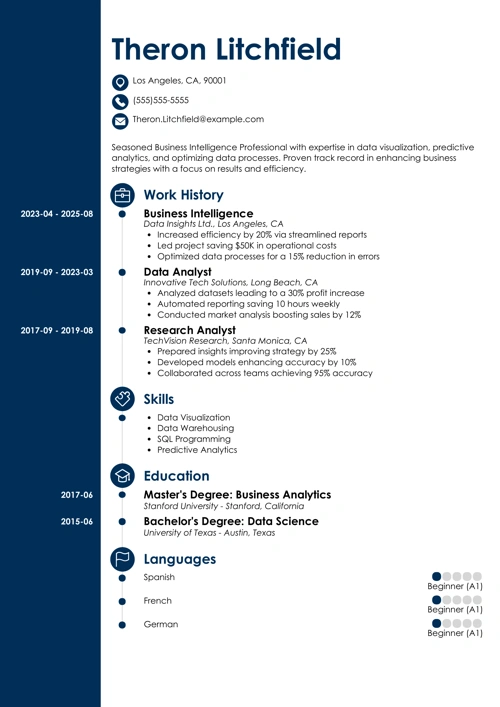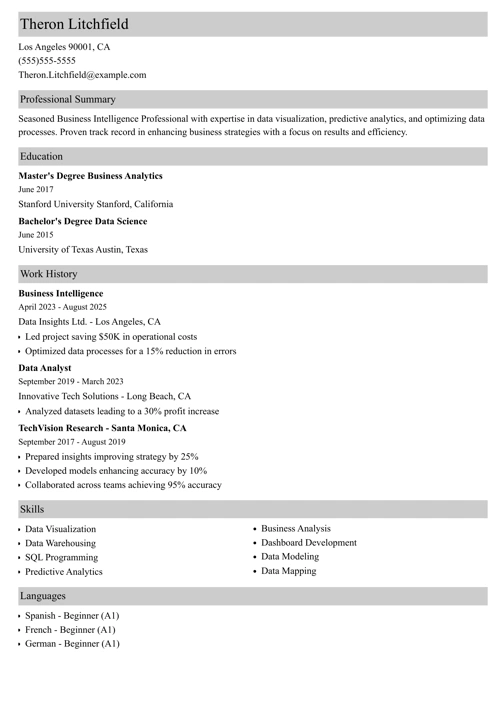Most people hate numbers. But you actually enjoy working with them. Understanding what they stand for really helps, and knowing how to use them to make business decisions is your specialty.
Your skills are in high demand, but some businesses will underestimate your role and try to convince you that you’re not that valuable to them. Know your value. Write a business intelligence resume that gets you into a Fortune 100 company.
This guide will show you:
- A business intelligence resume example better than 9 out of 10 other resumes.
- How to write a business intelligence resume that will land you more interviews.
- Tips and examples of how to put skills and achievements on a business intelligence resume.
- How to describe your experience on a resume for a business intelligence specialist to get any job you want.
Want to save time and have your resume ready in 5 minutes? Try our resume builder. It’s fast and easy to use. Plus, you’ll get ready-made content to add with one click. Explore our free resume templates and start building your resume today.
Sample resume made with our builder—See more resume examples here.
Looking for other IT positions resume advice? Cast a glance at our guides:
- Business Intelligence Developer Resume
- Power BI Resume
- Computer Science Resume
- Data Analyst Resume
- Data Engineer Resume
- Business Analyst Resume
- Business System Analyst Resume
- Programmer Resume
- Business Resume
- Program Analyst Resume
- Resume Examples for 500+ Jobs
Business Intelligence Analyst Resume Sample
Theron Litchfield
theron.litchfield@gmail.com
415-201-9993
Objective
Collaborative and technically-minded business intelligence analyst with 6+ years of experience in Big Data crunching. Eager to support DatAxe with expert analytical skills to advance the company’s business operations and strategic initiatives. In previous roles reduced account receivables by 18% by improving billing strategy, as well as boosted sales by 15% through recommendations on process improvements.
Work Experience
Senior Business Intelligence Analyst
InfoSys, Los Angeles, CA
2016–
- Operationalized business intelligence solutions and conducted advanced analytics to identify opportunities and strengths to meet business goals.
- Presented and communicated the findings in an understandable and actionable way tailored to the audience and customer's needs.
- Established long-term and value-added relationships with assigned business partners to educate and develop the analytic capability of business customers and the organization.
- Created and maintained data visualizations that educated, informed and engaged business partners on key metrics and performance measures.
- Collaborated with enterprise data warehouse, data governance, and business teams on data quality issues, as well as architecture or structure of data repositories.
Key achievements:
- Trained 10+ business users in data modeling in Excel using PowerPivot for creating ad-hoc reports.
- Converted 300+ reports from Oracle Reports into SSRS.
- Identified and recommended process improvements that boosted sales by 15% over a quarter.
Business Intelligence Analyst
Datrix Systems, San Francisco, CA
2013–2016
- Worked with cross-functional teams to structure problems, identify appropriate data sources, extract data and develop integrated information delivery solutions.
- Played key roles in medium to large projects (e.g. data modeler, data architect).
- Participated and provided technical leadership in all phases of BI projects: from discovery and planning through implementation and delivery.
- Performed cleansing, de-duplication, and harmonization of data across various systems.
- Supported the planning and coordination of data governance activities.
- Developed and maintained an enterprise data architecture roadmap to improve the maturity and effectiveness of enterprise data management.
Key achievement:
- Coordinated the conversion of 200+ reports from Crystal Enterprise to SSRS.
- Redesigned the company’s strategic approach to billing that resulted in boosting revenue by 7% and reducing accounts receivable by 18%.
Education
Master of Information and Data Science
University of California, Berkeley, CA
2013
B.A., Information Systems
UCLA, Los Angeles, CA
2011
Key Skills
- SQL Server
- HIVE
- Data visualization
- Tableau
- Qlik Sense
- MS Excel
- MS PowerPoint
- Analytical skills
- Communication
- Critical thinking
Certifications
- SQL BI Certification—Microsoft
- SAS Big Data Certification
- Intellipaat Big Data Hadoop Certification
Languages
- Spanish—Advanced
Interests
- Sci-Fi movies of the 80s
- Windsurfing
Here’s how to write a business intelligence resume that demonstrates your intelligent approach to the resume science:
1. Choose the Best Format for Your Business Intelligence Analyst Resume
A single glance is enough for a recruiter to have an opinion about you as a candidate.
Here’s how to make the best impression possible:
- Kick off with a resume header that has your phone number and contact info.
- Divide your resume into sections. Label each of them with an appropriate header.
- Choose the resume format that’s best for your situation. Most often, a chronological resume is your best bet as it highlights your latest achievements and experience.
- The font for your resume should be easily legible and not too small.
- Don’t clutter your resume with too much information. Consider white space your friend.
- Submit your resume in a PDF format. Resumes in MS Word are ok if you have been asked for them.
2. Write a Business Intelligence Resume Summary or Objective
The top section of the page should be taken up by a profile on your resume.
It’s a short paragraph that brings together the highlights of your resume and is a written version of an elevator pitch.
You have two choices:
A resume summary is great for a senior business intelligence analyst resume with at least 2 years of experience. It focuses on your experience and achievements.
A resume objective is suitable for an entry-level business intelligence analyst resume. It focuses on the skills that make you a perfect fit for the position.
Either way, the opening section of your resume will benefit a lot if you put numbers that demonstrate your impact.
Pro Tip: Write your resume profile once your entire resume is ready. It will be much easier to pick out the meatiest bits.
3. Create the Perfect Business Intelligence Job Description for a Resume
Your resume work experience is vital.
It must convince the recruiter you’ll get the job done better than the other 250+ candidates.
How do you do this?
The first step is to tailor your resume to the job posting:
- First, say what your latest job was and then move on to the previous ones.
- Each entry in your experience section should consist of your job title, company name and location, and dates worked.
- Use bullet points. Don’t write paragraphs. 5-6 bullets per job will be enough.
- Each bullet point should start with a resume action verb, such as developed, redesigned, supported, collaborated, etc.
- Focus on the experience that’s relevant to the position.
Pro Tip: Quantify as many of your experience bullets as you can. Cherry pick the things you take the most pride in and put them in a key accomplishments subsection.
Making a resume with our builder is incredibly simple. Follow our step-by-step guide, use ready-made content tailored to your job and have a resume ready in minutes.
When you’re done, Zety’s resume builder will score your resume and our ATS resume checker will tell you exactly how to make it better.
4. Make Your Business Intelligence Analyst Resume Education Section Stand Tall
Let’s admit it—
Your resume education section is just as crucial as any other.
Here’s how to cope with it smoothly and quickly:
- If you have 5+ years of professional experience limit your education section to listing your degree, graduation date, school name, and location.
- Less experience? Consider including your extracurricular activities, academic awards and achievements, as well as relevant coursework.
If you want to include a certification on your resume it’s a good idea to create a dedicated section to make it more visible.
Pro Tip: You can also add info on your GPA score if it was upwards of 3.5 and if you graduated less than 3 years ago.
5. Highlight Your Business Intelligence Analyst Skills
There’s one thing all recruiters have in common—
They look for skills.
The list below will help you identify your core business intelligence analyst strengths:
Business Intelligence—Skills for a Resume
- Big data
- Business Objects
- Data analysis
- Data architecture
- Data management tools
- Data reporting
- Data visualization
- Data warehousing
- HIVE
- MS Office
- MS Excel
- MS PowerPoint
- Multitasking
- Qlik Sense
- Quantitative analytic methodologies
- Relational databases
- SAS
- Scripting languages
- SQL Server
- Statistics
- Tableau
- Analytical skills
- Teamwork skills
- Communication
- Critical thinking
- Conceptual skills
- Decision making
- Leadership
- Problem solving
- Presentation skills
- Time management
Here’s how to pick out skills relevant to the position:
- Make a list of your good skills to put on a resume, and include your hard and soft skills, as well as all your technical strengths.
- Revisit the job listing to see what skills it mentions by name.
- Pick out these skills from your master list.
- Put up to 10 of your strongest skills in a key skills resume section.
- Shower your entire resume with skills: put some in the resume profile and job description too.
Pro Tip: To avoid falling victim to the presenter's paradox, focus on your strongest skills and leave out all the others.
6. Add Other Sections to Your Business Intelligence Analyst Resume
Wow the recruiter by adding some extra sections to your business intelligence resume:
7. Attach a Business Intelligence Resume Cover Letter
How important are cover letters?
Quite important.
Why?
Half of the recruiters expect you to send a cover letter.
Here’s how to how to make a job-winning cover letter in a matter of minutes:
- Familiarize yourself with different formats of a cover letter.
- Learn to write good cover letter openings to set the tone.
- Explain to the hiring manager what value you’ll bring to the company.
- Craft your cover letter ending so it urges the recruiter to call you.
Make sure the length of your cover letter doesn’t discourage the recruiter from reading it.
Pro Tip: Write and send a follow up email for a job to stand out.
Plus, a great cover letter that matches your resume will give you an advantage over other candidates. You can write it in our cover letter builder here. Here's what it may look like:
See more cover letter templates and start writing.
This is it!
This is how you make a job-winning resume for business intelligence analyst positions.
We've got some more resumes you might want to take a look at!
- Data Scientist Resume
- Machine Learning Resume
- Network Administrator Resume
- Information Security Analyst Resume
- Analyst Resume
- Software Engineer Resume
- SQL Developer Resume
- Solution Architect Resume
- Software Developer Resume
- System Administrator Resume
- Salesforce Admin Resume
- .NET Developer Resume
- Cyber Security Resume
- QA Resume
- Actuary Resume
- Network Engineer Resume
- Java Developer Resume
About Zety’s Editorial Process
This article has been reviewed by our editorial team to make sure it follows Zety's editorial guidelines. We’re committed to sharing our expertise and giving you trustworthy career advice tailored to your needs. High-quality content is what brings over 40 million readers to our site every year. But we don't stop there. Our team conducts original research to understand the job market better, and we pride ourselves on being quoted by top universities and prime media outlets from around the world.





